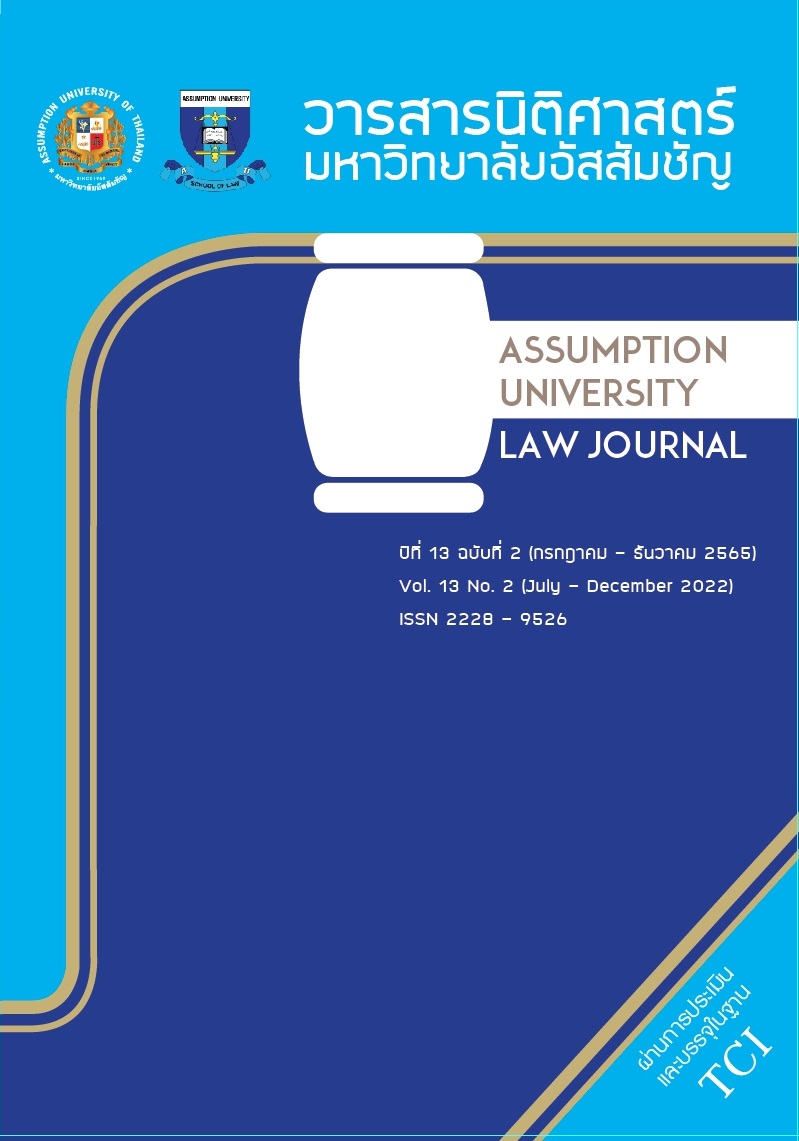Soft Skills สำหรับนักกฎหมำยในศตวรรษที่ 21: กำรพัฒนำทักษะกำรโค้ชเพื่อกำรสื่อสำรอย่ำงเห็นอกเห็นใจสำหรับนักกฎหมำย
Soft Skills for Legal Professionals in 21st Century: Developing Coaching Skills for Empathic Communication for Lawyers
Keywords:
ทักษะที่สาคัญ, นักกฎหมายในศตวรรษที่ 21, ทักษะการโค้ช, การสื่อสารอย่างเห็นอกเห็นใจ, Soft Skills, Lawyers in 21st Century, Coaching Skills, Empathic CommunicationAbstract
บทคัดย่อ
บทความวิจัยฉบับนี้มุ่งศึกษาความหมายและความสาคัญ กระบวนการและวิธีการที่เกี่ยวข้องกับการพัฒนาทักษะ รวมไปถึงปัญหาเกี่ยวกับทักษะและการพัฒนาทักษะการโค้ช (coaching) เพื่อการพัฒนาทักษะการโค้ชสาหรับการสื่อสารอย่างเห็นอกเห็นใจสาหรับนักกฎหมาย เพราะการสื่อสารเป็นสิ่งที่นักกฎหมายจาเป็นต้องทาตลอดเวลา โดยเฉพาะอย่างยิ่งในศตวรรษที่ 21 ซึ่งเป็นยุคการสื่อสารไร้พรมแดนและยุคแห่งความเปลี่ยนแปลงตลอดเวลา การพัฒนาทักษะการโค้ชเพื่อการสื่อสารอย่างเห็นอกเห็นใจสาหรับนักกฎหมายจึงมีความสาคัญอย่างยิ่ง โดยการพัฒนาดังกล่าวต้องสอดคล้องกับการพัฒนาคุณธรรมและจริยธรรมสาหรับผู้ประกอบวิชาชีพนักกฎหมายในอนาคต ผู้วิจัยจึงมีข้อเสนอแนะให้หลักสูตรนิติศาสตร์ตระหนักถึงความสาคัญของการพัฒนาทักษะการโค้ช ทักษะดังกล่าวประกอบด้วยทักษะสาคัญๆ ได้แก่ การฟังอย่างลึกซึ้ง การตั้งคาถามอันทรงพลัง การสะท้อนกลับ รวมถึงการส่งเสริมให้เกิดการพัฒนาทักษะการสื่อสารอย่างเห็นอกเห็นใจแก่นิสิต นักศึกษา โดยผู้สอนบรรยายในรายวิชาบังคับคือวิชาจริยธรรมสาหรับนักกฎหมาย เพื่อเข้าจึงความหมายและความสาคัญของการชี้แนะ และการสื่อสารอย่างเห็นอกเห็นใจ ผ่านกระบวนการฝึกฝน การฟัง การถาม การสะท้อนกลับ รวมถึงทักษะที่เกี่ยวข้องอื่นๆ
Abstract
This study examines Soft Skills for Lawyers in 21st Century: Developing Coaching Skills for Empathic Communication for Lawyers. The legal professional is a profession that requires human skills because they must work with people who are facing with problems such as clients or parties. Communication skill is a must for lawyers, especially in 21st Century which is an era of borderless communication with constantly changing. The development of empathy and empathic communication skills in law schools is essential because it is related to the development of moral and ethics for those who will practice in legal profession the future. This research suggests that law programs recognize the importance of developing faculty members to have coaching skills which consists of major skills, including deep listening, powerful questioning and reflection as well as related skills, such as skills in rapport building. The outcome can be done by setting new teaching and learning styles in compulsory courses such as criminal law or tort law subjects including literature reading, storytelling, watching movies, analyzing feelings and emotions of each character, or having students to perform a role play related to the facts in the case.
Downloads
Published
Issue
Section
License
- บทความทุกเรื่องได้รับการตรวจทางวิชาการโดยผู้ทรงคุณวุฒิ (Reader) จากภายในและนอกมหาวิทยาลัย
- ความคิดเห็นใดๆ ที่ลงตีพิมพ์ในวารสารกฎหมายคณะนิติศาสตร์ มหาวิทยาลัยอัสสัมชัญ เป็นของผู้เขียน (ความคิดเห็นใดๆ ของผู้เขียน กองบรรณาธิการวารสารกฎหมายคณะนิติศาสตร์ มหาวิทยาลัยอัสสัมชัญไม่จำเป็นต้องเห็นด้วย)
- กองบรรณาธิการวารสารกฎหมายคณะนิติศาสตร์ มหาวิทยาลัยอัสสัมชัญ ไม่สงวนสิทธิในการคัดลอก แต่ให้อ้างอิงแสดงแหล่งที่มาด้วย


